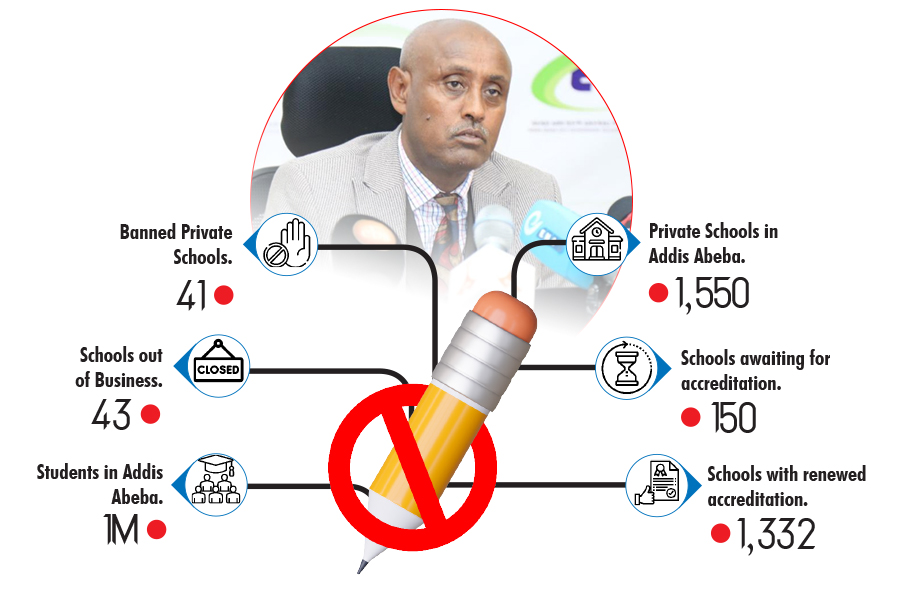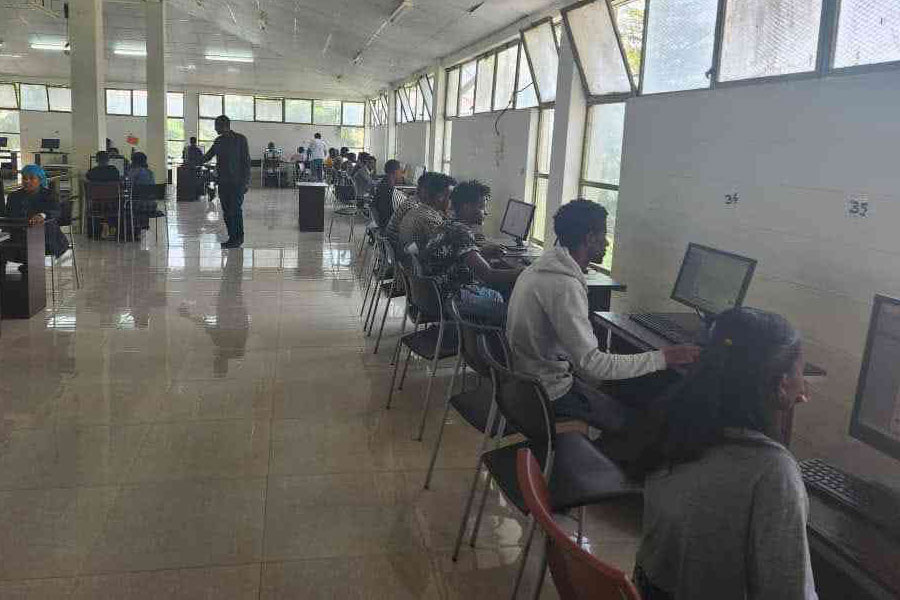
Fortune News | Nov 26,2022
Hundreds of thousands of students will sit for the national exams across the country but in a significantly changed arrangement leaving their families anxious. Unlike before, students leaving high schools will not take their enrollment in their respective schools, but in universities and colleges far from their homes.
Close to 976,018 students - more than half male - are scheduled to take two-week national examinations beginning tomorrow, October 10, 2022. This number represents a 63pc increase from last year, a tremendous leap for authorities to manage.
Public buses have been deployed to transport these students, crisscrossing the country and carrying young women and men away from home for the first time.
The Ministry decided to shift exam centres from high schools to universities, as precautionary measures to prevent what its officials claim is insecurity surrounding the exams’ confidentiality and prevent recurrent leaks ahead of time. They also claim to expose students to unfamiliar environments distant from their natural habitat to help build confidence and self-assurance.
For students and their families, it remains a source of frustration. They have mixed feelings about the change of venues.
Melat Mitiku, 20, is one of these students assigned to take the exam at a venue different from her high school, the Ethio-Japan School.
She has been preparing to sit for the national exam for the whole year.
Melat says, “I am ready to take the exam.”
Examinees from Gurage zones are entering Wolkite University, SNNP regional state, with uniforms on. It is the first time the Ministry of Education commenced a kind of national exam arrangement in higher educational institutions. Students are supposed to stay in the compound within the overall exam dura-tion.
She did not need to travel far away. On Saturday, she and her fellow students had gathered, waiting for transport to take them to Civil Service University, on the eastern side of Addis Abeba. She began her journey with anticipation of experiencing the feel of a college compound. However, the close distance appears to make Melat no less frustrated.
“But the place is different, and the examiners are instructors whom we don’t know,” she said.
Shumete Berehane is the director of Ethio-Japan School. Onboard in the journey of taking the students to the university where they are assigned to take the exams, he acknowledged the psychological bearing of the change of venue on the students.
“The government is working to avoid cheating,” he told Fortune. “As the exams are not sent to every high school, there will be a high level of effort in securing them. The universities are not too many.”
The rampant leak of the exams causes deep concern to the authorities.
Last year, they called off civic and ethical education exams after discovering they were leaked. It was not the first time, although the degree varies perennial. Six years ago, the authorities cancelled the national exam after the papers were stolen.
The Ethiopian National Educational Assessment & Examination Agency is a federal entity responsible for administering national exams.
Its Deputy General Manager, Yilkal Wondimeneh, believes changing venues for the national exams is a response to control exam manipulations in “certain exam centres”.
“Previously, the exam was sent to every high school, and there was a high possibility of insecurity,” he told Fortune.
Ethiopia has a long history of conducting national examinations since 1945. It has continued to focus its efforts on a better measuring system and improving the effectiveness of the education process, a directorate for school inspection within the Ministry of Education. Together with the Agency, these institutions have formulated new national policies and guidelines on national assessment activities and examinations, introducing a new school inspection framework and guidelines.
Their officials believe they could control exam leaks as examiners from universities are assigned to every centre that would give room to students taking the exams. They also think the physical insecurity can be addressed while transporting printed exams from Addis Abeba, offering opportunities to the students to have university exposure.
What Mulatu Fantay, a lecturer at Addis Abeba Science & Technology University, experienced with most students enrolled on colleges having inadequate preparation and lack of parental follow-ups during their secondary education.
“Some depend only on their teacher’s materials and classroom explanations,” Mulatu told Fortune. “They don’t experience how to gain concepts, structures, and the tenets of the material being taught.”
Experts argue changing exam venues can do little to change what is lacking at the foundational level. They warn a fix at the top will be a futile exercise.
Tirusew Tefera (Prof.) is an expert in the education sector. He sees the authorities’ decision to change venues as a temporary intervention, “an attempt to curb the educational malaise ensuing for years.”
“This problem can be addressed systematically,” he told Fortune. “The government must start with lower grades, and help students develop confidence in themselves.”
Those at the lower end of the learning curve, such as Messele Mehari, say the impactful work needs to start before students sit for school leaving exams. Meselle serves as a director for the Akaki Lesperance School.
It was established in 1943, by the Adventist church 25Km south of Addis Abeba.
Messele runs the school with a good reputation for preparing nearly 3,000 students for college ensuring “quality education and developing the confidence of students.” Factors such as content, learning environment, school management, parental help and students’ interests play significant roles in realizing quality in education. Messele, however, believes administering exams with integrity is one factor in ensuring the quality of education.
For the first time, students take their secondary school leaving examinations in the universities. Officials pledge they are adequately prepared with the logistics and venues of the exams to see hundreds of thousands return to their homes safely.
The national exams will be given in two rounds: social science students will sit for the two-day exam beginning October 10. Natural science students will take the exam for three days starting October 16. Students will be prohibited from using digital tools such as phones and laptops or carrying flash disks.
“They told us there is a possibility to communicate with our parents if there is any problem,” Melat told Fortune, feeling apprehensive.
Although parents may feel unease, educators like Tirusew urge them “not to worry much”, for the days away are brief. According to him, this could be a good experience for the students to join universities.
Says Tirusew: “This intervention can play a significant role in alerting students to develop their competency instead of depending on others.”
Bethelhem Tekele is another student in Melat’s class at the Ethio-Japan. On Saturday, she was nervous about going to a new place, “which made us all worry about taking the exam without any tension.”
PUBLISHED ON
Oct 08,2022 [ VOL
23 , NO
1171]

Fortune News | Nov 26,2022

Fortune News | Mar 20,2021

Radar | Apr 30,2021

Fortune News | Jul 13,2020

Sunday with Eden | May 03,2025

Fortune News | Jun 22,2024

Fortune News | May 04,2019

Radar | Jul 15,2023

Agenda | Jul 08,2023

Radar | Aug 23,2025

Dec 22 , 2024 . By TIZITA SHEWAFERAW
Charged with transforming colossal state-owned enterprises into modern and competitiv...

Aug 18 , 2024 . By AKSAH ITALO
Although predictable Yonas Zerihun's job in the ride-hailing service is not immune to...

Jul 28 , 2024 . By TIZITA SHEWAFERAW
Unhabitual, perhaps too many, Samuel Gebreyohannes, 38, used to occasionally enjoy a couple of beers at breakfast. However, he recently swit...

Jul 13 , 2024 . By AKSAH ITALO
Investors who rely on tractors, trucks, and field vehicles for commuting, transporting commodities, and f...

Oct 11 , 2025
Ladislas Farago, a roving Associated Press (AP) correspondent, arrived in Ethiopia in...

Oct 4 , 2025
Eyob Tekalegn (PhD) had been in the Governor's chair for only weeks when, on Septembe...

Sep 27 , 2025
Four years into an experiment with “shock therapy” in education, the national moo...

Sep 20 , 2025
Getachew Reda's return to the national stage was always going to stir attention. Once...